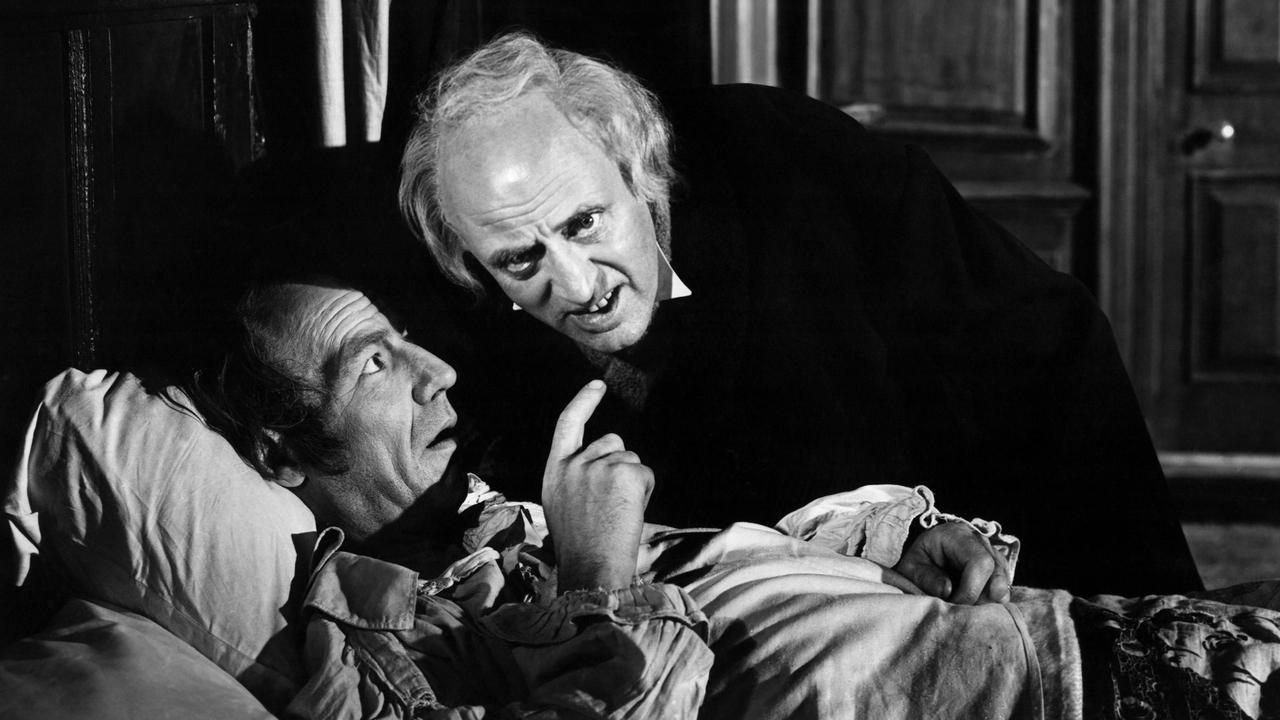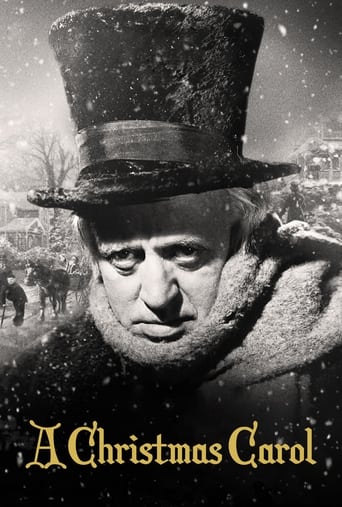

A George Minter Production for Renown Pictures Corporation. U.K. release through Renown: 4 December 1951. 7,758 feet. 86 minutes. U.S. release title: A CHRISTMAS CAROL. U.K. title: SCROOGE.COMMENT: While the sets and characters have not been modelled on Leech's original illustrations (which are far too grotesque), a commendable effort has been made to give an impression of 1843 London. That impression is more sanitized and less realistic than the 1935 movie but it is still a recognizable and lavishly realized Dickensian world. The "good people" alas are still somewhat wooden and insipid (although Roddy Hughes brings admirable life to Fezziwig), but the less angelic and more eccentric characters are brilliantly portrayed by people like Miles Malleson, Jack Warner, Kathleen Harrison and Ernest Thesiger. I enjoyed Hordern's portrait of the smug Marley, but was less impressed by his way-out exaggerated ghost which would have been more effective had he stolen a few pointers from the 1935 version. Sim enthusiastically both over-acts and over-reacts, but he is still both effective and convincing. Langley's script sticks close to Dickens and even utilizes much of the original dialogue. The movie is not only beautifully photographed but superbly set. By the oddly variable standards of Brian Desmond Hurst (who managed to mix masterpieces like On the Night of the Fire with real clinkers like The Hundred Pound Window during the course of his career), Scrooge definitely ranks as one of his more engaging and skilfully imaginative productions. It's impossible not to be moved by this account of Scrooge's fall and redemption. OTHER VIEWS: Despite the movie's present-day acclaim, contemporary reviews varied widely from the highly enthusiastic (Lionel Collier in Picturegoer, F. Maurice Speed in Film Review) to the damned with faint praise. The Monthly Film Bulletin review was typical of the latter, the critic complaining of Hurst's "not altogether successful" direction as well as the "unhelpful" music score. As for the cast, Kathleen Harrison, as usual, was singled out for universal praise, but many thought that neither Sim nor Johns looked right for their parts. Sim came over as a "dour dyspeptic" rather than as a "wrenching miser" and Johns seemed far too cheery and ebullient for a man reduced to near starvation.
... View MoreThis film, directed brilliantly by Brian Desmond Hurst, a director with whom I am otherwise unfamiliar, was clearly a labor of love. All of the various components, including the atmospheric sets, the period costumes, the mood setting music (both up and down), the compelling story, and, above all, the superb acting, blend to form a very rare cinematic creation of perfection. I always enjoy Alastair Sim ("Bells of St. Trinians, "Green for Danger", "Stage Fright", etc.), but the man was born for the role of Ebeneezer Scrooge, and although others, especially George C. Scott, have made a noble effort to interpret the part, Mr. Sim, for me, will always be the definitive character. I will always compare other Scrooges to him, and, so far, they can't approach him in his remarkable depiction. Sim is to Ebeneezer what Jackie Gleason is to Ralph Kramden. Don't even try to duplicate them.Sim's outstanding performance is enhanced by a stellar supporting British cast, most notably Kathleen Harrison as the consummate Mrs. Dilber, Scrooge's maid, Mervyn Johns as Bob Cratchet, his long suffering but amiable assistant, and Michael Hordern as the ghost of Jacob Marley. "Mankind is my business!"Although the film was created in 1951, the director painstakingly delivers us deep into an authentically dark and gloomy world of Dickensian London. As Bob-724 astutely observes in his review, Scrooge is not "redeemed" as much as "restored" to his original decency and goodness before being corrupted by the world around him, including its empty, materialistic values that are void of spiritual gratification. When Scrooge says "humbug", he is not condemning Christmas as much as the hypocrisy and phoniness of the people around him who are struggling to survive in a hostile, unkind world as he has since birth. I do admit that I enjoyed the disdainful, derisive Scrooge much more than the "restored" character. I have been quoting him for more than sixty years now, but I can never replicate the nasty sting of the unsurpassable Alastair Sim. God bless us , everyone!
... View MoreChristmas isn't Christmas without an annual viewing of this, arguably the best adaptation of Charles Dicken's classic tale "A Christmas Carol". Brilliantly filmed & acted, not just by Alistair Sim as old Scrooge but also by George Cole as the younger man. It has tons of atmosphere, a great score & is a very effective ghost story. Just don't bother with the colourised version, this was meant to be seen in black & white. Humbug!!
... View MoreAn old bitter miser (Alistair Sim) is given a chance for redemption when he is haunted by three ghosts on Christmas Eve.This is generally considered the best adaptation of "A Christmas Carol" ever made. That is a bold statement, given how many have been made (dozens, maybe hundreds). But, indeed, if it is not, it certainly ranks among the more prominent. (For my money, "Muppet Christmas Carol" is the best, though it may be a bit different.) Regardless, this one, having been made in 1951, has no doubt influenced future versions for more than sixty years.Worth checking out if you like the story and have not seen this version. It does not stray far from the novella, and therefore is not much different from most other versions, but still has a strong cast.
... View More